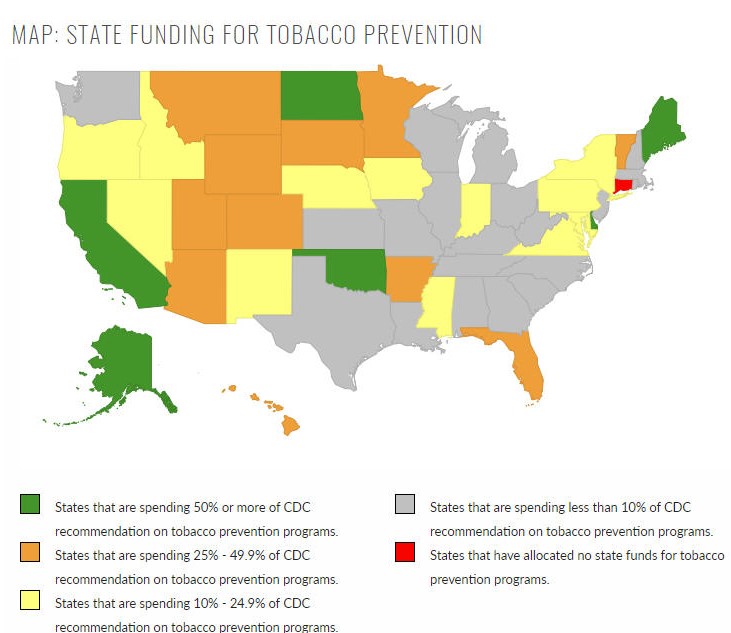A recent report ranks Georgia No. 49 among the states and the District of Columbia on preventing kids from using tobacco products.
The report, released by several public health organizations, measures states’ spending of tobacco settlement dollars on prevention, in fighting both tobacco use and the rise in e-cigarette use among kids.
This fiscal year, the states will collect $27.2 billion from the 1998 tobacco settlement and tobacco taxes. But they will spend less than 3 percent – $739.7 million – on programs to prevent kids from using tobacco and help smokers quit.
In Georgia, that percentage is just 0.7 percent, with $750,000 appropriated in each of the past two fiscal years. Georgia also has the third-lowest tax on cigarettes in the United States at 37 cents per pack, lower than every state but Missouri and Virginia. The national average is $1.81.
The report – “Broken Promises to Our Children: A State-by-State Look at the 1998 Tobacco Settlement” – was released by the Campaign for Tobacco-Free Kids, the American Cancer Society-Cancer Action Network, the American Heart Association, the American Lung Association, Americans for Nonsmokers’ Rights, the Robert Wood Johnson Foundation and the Truth Initiative.

The legal settlement between 46 states and the major tobacco companies, along with individual settlements with four other states, required the companies to pay more than $246 billion over time as compensation for tobacco-related health care costs.
The “Broken Promises’’ report also addresses young people’s increasing use of e-cigarettes, which contain nicotine, the same harmful ingredient found in tobacco. Counting e-cigarettes, the percentage of high school students who use tobacco products is at its highest level in 19 years. Last year, 31.2% of high school students and 12.5% of middle school students used some type of tobacco product, according to the 2019 National Youth Tobacco Survey.

And last year saw the rise of serious lung illnesses related to vaping (the use of smokeless aerosol devices such as e-cigarettes). These illnesses have been linked to more than 50 deaths nationally, including five in Georgia, among the highest totals of any state.
Raising the tobacco tax has been an annual push by health advocates in Georgia, but the Legislature has rejected the move, with the political leadership critical of such a tax hike. House Speaker David Ralston (R-Blue Ridge), when asked about a possible tax hike last year, noted that adult smoking rates have declined in the United States. “I’m always hesitant to suggest raising taxes in any event,‘’ including for tobacco use, he said.
Still, raising the tax on cigarettes is again expected to be a proposal for the Legislature to consider, especially with the increased pressure on the state budget and spending. It may be accompanied by a proposed levy on e-cigarette purchases.
“We don’t tax e-cigarettes,’’ says Andy Freeman, legislative director for the American Cancer Society’s Cancer Action Network. “There’s no requirement in Georgia to license retailers that sell e-cigarette products.‘’
By raising the tobacco tax to the national average, and charging retailers more to sell tobacco products, the state could raise almost a half-billion dollars in new revenues per year, Freeman says. “We could make the state a better place to live and work and fix the problems with the state budget.’’
It could pay for health care programs, help prevent kids from using tobacco products and help adults to quit, Freeman adds.
Tobacco use –– the single most preventable cause of disease, disability, and death in the U.S. –– causes more than 11,000 deaths in the state annually, and its direct health care costs amount to more than $3 billion a year.

This week, meanwhile, the City of Atlanta ordinance prohibiting smoking, including the use of e-cigarettes in public places, went into effect. It includes the world’s busiest airport, Hartsfield-Jackson Atlanta International Airport.
And the Wall Street Journal reported that the FDA plans to ban the sale of fruity flavors in cartridge-based e-cigarettes. But the restriction won’t apply to tank vaping systems commonly found at vape shops, according to people familiar with the matter, the Journal reported.
The action is seen as a compromise between Trump administration officials who want to address a rise in teen vaping and those concerned about the impact on small businesses and the possible political fallout for President Trump, the Journal reported.
“The e-cigarette epidemic is disrupting the lives of kids and families in every community, so it is critical that every state step up and do its part to end this crisis,’’ Matthew L. Myers, president of the Campaign for Tobacco-Free Kids, said in a statement. “That includes properly funding proven tobacco prevention programs, as well as prohibiting the flavored products that have fueled this epidemic. We need a comprehensive, all-hands-on-deck strategy to prevent e-cigarettes from addicting a generation of children.”

